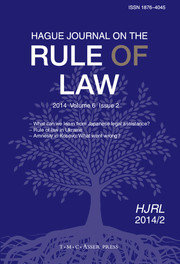No CrossRef data available.
Article contents
Searching for a ‘Good Struggle’: Comments on ‘The Justice-Security-Development Nexus: Theory and Practice in Fragile and Conflict-Affected States’ by Doug Porter, Deborah Isser & Louis-Alexandre Berg
Published online by Cambridge University Press: 10 October 2013
Extract
The World Bank's approach to legal and judicial reform has undergone an interesting evolution in recent years as it has come to realise that there are no quick fixes. It has shifted from a formalistic top-down approach to a more comprehensive approach that focuses on governance and on the interests and aspirations of local communities. Thus, while originally the Bank focused mainly on making higher courts more efficient and on modernizing the commanding heights of state institutions, today Bank projects are more sensitive to issues relating to legal pluralism, access to justice, gender and legal empowerment.
This broader approach to reform is reflected in the Bank's successful Justice for the Poor (hereafter J4P) programme, which aims to ensure that reform projects take into account the perspective of the poor and marginalized within a framework that supports equitable and sustainable development. J4P projects focus on access to justice, natural resource governance and service delivery in countries such as Indonesia, Kenya, Nigeria, Sierra Leone, the Solomon Islands, South Africa, the Philippines and Vanuatu. The three authors of the paper under review, Doug Porter, Deborah Isser and Louis-Alexandre Berg (hereafter PI&B) work for the Bank's J4P programme. Thus, their views are based on detailed knowledge about fragile states and extensive academic reflection on the obstacles to reform. Their views are also important because if accepted, they would mark a significant new departure for the World Bank in the area of legal and judicial reform.
- Type
- Notes
- Information
- Copyright
- Copyright © T.M.C. Asser Press and the Authors 2013




